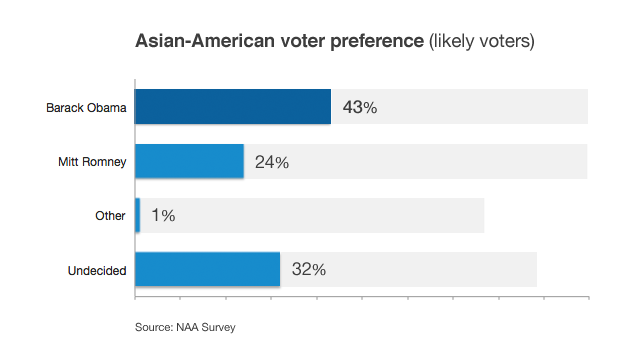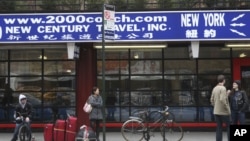A recent study suggests that nearly a third of Asian American voters have not yet decided between incumbent Barack Obama and Republican challenger Mitt Romney in the U.S. presidential election, which is less than five weeks away.
The National Asian American Survey released last week found that 43 percent of Asian Americans support Obama, compared to 24 percent for Romney.
But the survey said 32 percent are have not made up their mind - a figure three to four times the national average. It said over half do not associate with a particular political party.

Karthick Ramakrishnan, who helped conduct the survey says this is because most Asian Americans have not been in the U.S. long enough to find their place in American politics.
"Asian Americans are predominantly a first generation immigrant population. Given their immigration background, it takes them a while to fully get used to the U.S. political system and to see where they fit in terms of the political parties and the major campaigns," said Ramakrishnan.
Asian Americans are one of the fastest growing populations in the United States. The Pew Research Center said earlier this year they have overtaken Hispanics as the largest group of new immigrants arriving in the U.S. every year.
But Ramakrishnan, who is also a professor at the University of California Riverside, says Asian American participation in the current presidential election is the lowest of any racial or ethnic group in the United States. He estimates they are a decade or two behind Hispanics in terms of political involvement.
Because of this, and the fact that most Asian Americans do not live in so-called "battleground" states, Ramakrishnan says both the Romney and Obama campaigns appear to have mostly ignored the community. But he says Asian American votes, especially in certain states, could still make a difference.
"Three states stand out as potentially important for the Asian American vote: Nevada, Virginia, and North Carolina," Ramakrishnan added. "These are all places where the Asian American share of the electorate might be bigger than the margin of victory."
As for what issues most Asians in America care about, Ramakrishnan says they are largely focused on the same things as most of the rest of America: how to fix the struggling economy and create more jobs.
The National Asian American Survey released last week found that 43 percent of Asian Americans support Obama, compared to 24 percent for Romney.
But the survey said 32 percent are have not made up their mind - a figure three to four times the national average. It said over half do not associate with a particular political party.

Karthick Ramakrishnan, who helped conduct the survey says this is because most Asian Americans have not been in the U.S. long enough to find their place in American politics.
"Asian Americans are predominantly a first generation immigrant population. Given their immigration background, it takes them a while to fully get used to the U.S. political system and to see where they fit in terms of the political parties and the major campaigns," said Ramakrishnan.
Asian Americans are one of the fastest growing populations in the United States. The Pew Research Center said earlier this year they have overtaken Hispanics as the largest group of new immigrants arriving in the U.S. every year.
But Ramakrishnan, who is also a professor at the University of California Riverside, says Asian American participation in the current presidential election is the lowest of any racial or ethnic group in the United States. He estimates they are a decade or two behind Hispanics in terms of political involvement.
Because of this, and the fact that most Asian Americans do not live in so-called "battleground" states, Ramakrishnan says both the Romney and Obama campaigns appear to have mostly ignored the community. But he says Asian American votes, especially in certain states, could still make a difference.
"Three states stand out as potentially important for the Asian American vote: Nevada, Virginia, and North Carolina," Ramakrishnan added. "These are all places where the Asian American share of the electorate might be bigger than the margin of victory."
As for what issues most Asians in America care about, Ramakrishnan says they are largely focused on the same things as most of the rest of America: how to fix the struggling economy and create more jobs.





